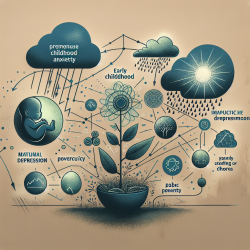Adolescent depression is a growing concern worldwide, with significant implications for the mental health and well-being of young people. A recent study titled "School Influences on Adolescent Depression: A 6-Year Longitudinal Study Amongst Catholic, Government and Independent Schools, in Victoria, Australia" sheds light on how different school environments can impact depressive symptoms among adolescents. This blog explores the key findings of the study and offers insights for practitioners seeking to enhance their skills in addressing adolescent mental health issues.
The Impact of School Environment on Depression
The study conducted by Rowland et al. (2022) examined depressive symptomology across three types of schools: Catholic, Government, and Independent. Over six years, data was collected from students aged 10 to 18 in Victoria, Australia. The findings revealed that adolescents in Catholic schools reported significantly fewer symptoms of depression compared to those in Government and Independent schools. This suggests that the ethos and practices associated with Catholic education may provide protective factors against depression.
Key Protective Factors
- Prosocial Behavior: The study highlights the importance of prosocial activities promoted within schools. Catholic schools often emphasize service and social justice, which may contribute to better mental health outcomes.
- Family Relationships: A strong attachment to parents was identified as a protective factor against depression. Encouraging family involvement in school activities can enhance this effect.
- Peer Interactions: Positive peer relationships and rewards for prosocial involvement were linked to lower levels of depressive symptoms. Schools should foster environments that promote healthy peer interactions.
Implications for Practitioners
For educators and mental health practitioners working with adolescents, these findings offer valuable insights into strategies that can be implemented within school settings to reduce depression. Here are some practical steps:
- Cultivate a Supportive School Culture: Schools can benefit from adopting an ethos that promotes caring values and prosocial behavior. This includes integrating service-oriented projects into the curriculum.
- Enhance Family Engagement: Schools should create opportunities for parents to participate in school life, strengthening family bonds and providing additional support for students.
- Encourage Peer Support Systems: Implement programs that encourage peer mentoring and support networks among students to foster a sense of belonging and community.
The study underscores the importance of considering the broader educational environment when addressing adolescent mental health. By implementing these strategies, practitioners can help create supportive school communities that promote positive mental health outcomes.
To read the original research paper, please follow this link: School Influences on Adolescent Depression: A 6-Year Longitudinal Study Amongst Catholic, Government and Independent Schools, in Victoria, Australia










